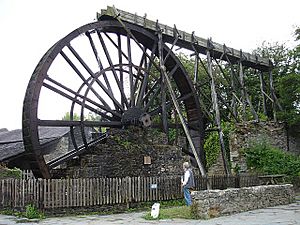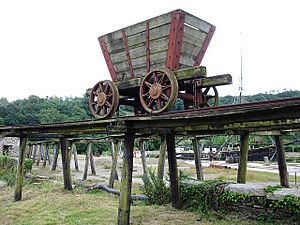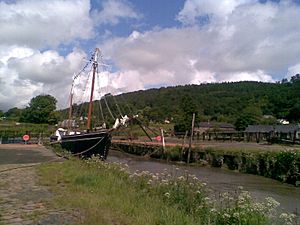Morwellham Quay facts for kids
Morwellham Quay is a special historic river port in Devon, England. It was built to help local mines transport their goods. This port was busiest during the Victorian era, a long time ago. Today, Morwellham Quay is a popular place to visit. It works as a museum where you can learn about its past. It's also the end point of the Tavistock Canal and has its own copper mine.
This amazing open-air museum lets you explore a village from the 1800s. You can see the old docks and quays, and even a restored ship. There's also the George and Charlotte copper mine, which you can tour on a small train! You can visit a Victorian farm and explore a nature reserve with walking trails.
In July 2006, a big international group called UNESCO gave Morwellham Quay a special award. They made it a World Heritage Site. This means it's a very important place for everyone to protect and learn from. Morwellham is right in the middle of the Tamar Valley Mining District. This area, along with nearby Tavistock, is a key part of the larger Cornwall and West Devon Mining Landscape World Heritage Site.
Morwellham Quay is also an important spot on the European Route of Industrial Heritage (ERIH). This route connects many interesting places that show Europe's industrial past.
Contents
History of Morwellham Quay
Early Days and Mining
Morwellham Quay was first started by Benedictine monks from Tavistock Abbey. The abbey was built in the year 961. The monks needed a way to move goods to and from Plymouth using the River Tamar. This was because the River Tavy was too difficult for boats.
By the 1100s, tin ore was being moved through the quay. Later, in the 1200s, lead and silver ores were also transported. Over time, people found copper deposits right at the Quay itself. This led to the opening of the George and Charlotte Mine in the 1700s. Around 1800, manganese was also mined from nearby Dartmoor. This ore was then brought to Morwellham.
The Tavistock Canal
By the late 1700s, moving goods by pack horses over rough land was too hard. So, in 1817, the Tavistock Canal was opened. This canal was about 4.5 miles (7.2 km) long. It included a 1.5-mile (2.4 km) tunnel! The tunnel ended 237 feet (72 m) above the quay at Morwellham. From there, an inclined plane was built. This was like a sloping railway that used a water wheel to lower iron barges down to the quay.
The Copper Boom
Morwellham Quay was at its busiest when the Devon Great Consols mine was working. This mine was only four miles north of the port. It shipped huge amounts of copper and later arsenic through the quay for almost 60 years, starting in 1844. Morwellham became famous as the "richest Copper port in Queen Victoria's Empire." Queen Victoria herself even visited in 1856!
Another inclined plane was built to carry the ore down the hill. A new quay was also added to handle the 30,000 tons of ore exported each year. Arsenic was also mined here. Morwellham became the world's biggest supplier of arsenic in the late 1800s. However, by 1903, the mines ran out of valuable ore and closed down.
Decline and Reopening
By the time the mines closed, railways had become the main way to transport goods. This meant Morwellham's importance as a port ended. The canal tunnel was then used to supply water for a hydroelectric power plant. The inclined planes were no longer needed.
In 2009, the local government stopped funding the mining museum. Because of this, the site faced financial trouble. But in April 2010, the owners of Bicton Park bought Morwellham Quay. It reopened to the public later that year.
What You Can See Today
Exploring the Museum
Morwellham Quay has been carefully kept to show what Victorian industrial and country life was like. You can see the old offices where people tested ores. There are also restored Victorian cottages, a farm, and schoolrooms. You can watch the ore-crushing machines working. These machines are powered by a huge 32-foot (9.8 m) waterwheel.
A special electric tramway was built in the 1970s for visitors. It takes you on a tour inside one level of the copper mine. There are also many ways to explore the valley's nature, both by water and on land. You can also see old lime kilns, which were used to make lime for building and farming.
Edwardian Farm TV Show
The BBC television series Edwardian Farm was filmed at Morwellham Quay. This happened during 2009 and 2010.
See Also
- New Quay (Devon) – A similar port nearby that is now abandoned.
- Calstock
- Harewood House, Calstock
 | Sharif Bey |
 | Hale Woodruff |
 | Richmond Barthé |
 | Purvis Young |




